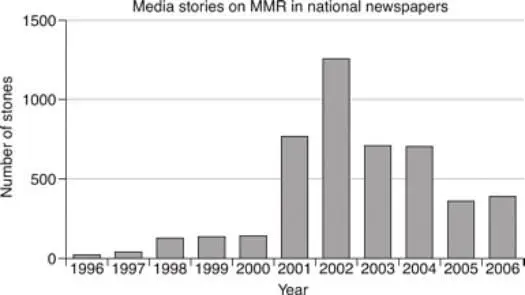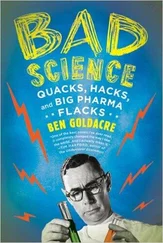Ben Goldacre - Bad Science
Здесь есть возможность читать онлайн «Ben Goldacre - Bad Science» — ознакомительный отрывок электронной книги совершенно бесплатно, а после прочтения отрывка купить полную версию. В некоторых случаях можно слушать аудио, скачать через торрент в формате fb2 и присутствует краткое содержание. Жанр: Публицистика, на английском языке. Описание произведения, (предисловие) а так же отзывы посетителей доступны на портале библиотеки ЛибКат.
- Название:Bad Science
- Автор:
- Жанр:
- Год:неизвестен
- ISBN:нет данных
- Рейтинг книги:5 / 5. Голосов: 1
-
Избранное:Добавить в избранное
- Отзывы:
-
Ваша оценка:
- 100
- 1
- 2
- 3
- 4
- 5
Bad Science: краткое содержание, описание и аннотация
Предлагаем к чтению аннотацию, описание, краткое содержание или предисловие (зависит от того, что написал сам автор книги «Bad Science»). Если вы не нашли необходимую информацию о книге — напишите в комментариях, мы постараемся отыскать её.
Bad Science — читать онлайн ознакомительный отрывок
Ниже представлен текст книги, разбитый по страницам. Система сохранения места последней прочитанной страницы, позволяет с удобством читать онлайн бесплатно книгу «Bad Science», без необходимости каждый раз заново искать на чём Вы остановились. Поставьте закладку, и сможете в любой момент перейти на страницу, на которой закончили чтение.
Интервал:
Закладка:
‘I tell all my patients who are pregnant that when the baby is born they must put it on the breast until there is no longer a pulse in the umbilical cord. It usually takes about 30 minutes. By doing this they transfer the mother’s immune system to the baby, who will then have a fully-functioning immune system and will not need vaccines.’ … Mr Temple refused to confirm yesterday whether he advised Mrs Blair not to have her baby Leo vaccinated. But he said: ‘If women follow my advice their children will not need the MMR injection, end of story.’
Daily Mail, 26 December 2001
Cherie Blair was also a regular visitor to Carole’s mum, Sylvia Caplin, a spiritual guru. ‘There was a particularly active period in the summer when Sylvia was channelling for Cherie over two or three times a week, with almost daily contact between them,’ the Mail reported. ‘There were times when Cherie’s faxes ran to 10 pages.’ Sylvia, along with many if not most alternative therapists, was viciously anti-MMR (over half of all the homeopaths approached in one survey grandly advised against the vaccine). The Daily Telegraph reported:
We move on to what is potentially a very political subject: the MMR vaccine. The Blairs publicly endorsed it, then caused a minor furore by refusing to say whether their baby, Leo, had been inoculated. Sylvia [Caplin] doesn’t hesitate: ‘I’m against it,’ she says. ‘I’m appalled at so much being given to little children. The thing about these drugs is the toxic substance they put the vaccines in – for a tiny child, the MMR is a ridiculous thing to do.
‘It has definitely caused autism. All the denials that come from the old school of medicine are open to question because logic and common sense must tell you that there’s some toxic substance in it. Do you not think that’s going to have an effect on a tiny child? Would you allow it? No – too much, too soon, in the wrong formula.’
It was also reported – doubtless as part of a cheap smear – that Cherie Blair and Carole Caplin encouraged the Prime Minister to have Sylvia ‘douse and consult The Light, believed by Sylvia to be a higher being or God, by use of her pendulum’ to decide if it was safe to go to war in Iraq. And while we’re on the subject, in December 2001 The Times described the Blairs’ holiday in Temazcal, Mexico, where they rubbed fruits and mud over each other’s bodies inside a large pyramid on the beach, then screamed while going through a New Age rebirthing ritual. Then they made a wish for world peace.
I’m not saying I buy all of this. I’m just saying, this is what people were thinking about when the Blairs refused to publicly clarify the issue of whether they had given their child the MMR vaccine as all hell broke loose around it. This is not a hunch. Thirty-two per cent of all the stories written that year about MMR mentioned whether Leo Blair had had the vaccine or not (even Andrew Wakefield was only mentioned in 25 per cent), and it was one of the most well-recalled facts about the story in population surveys. The public, quite understandably, were taking Leo Blair’s treatment as a yardstick of the Prime Minister’s confidence in the vaccine, and few could understand why it should be a secret, if it wasn’t an issue.
The Blairs, meanwhile, cited their child’s right to privacy, which they felt was more important than an emerging public health crisis. It’s striking that Cherie Blair has now decided, in marketing her lucrative autobiography, to waive that principle which was so vital at the time, and has written at length in her heavily promoted book not just about the precise bonk that conceived Leo, but also about whether he had the jab (she says yes, but she seems to obfuscate on whether it was single vaccines, and indeed on the question of when he had it: frankly, I give up on these people).
For all that it may seem trite and voyeuristic to you, this event was central to the coverage of MMR. 2002 was the year of Leo Blair, the year of Wakefield’s departure from the Royal Free, and it was the peak of the media coverage, by a very long margin.

What was in these stories?
The MMR scare has created a small cottage industry of media analysis, so there is a fair amount known about the coverage. In 2003 the Economic and Social Research Council (ESRC) published a paper on the media’s role in the public understanding of science, which sampled all the major science media stories from January to September 2002, the peak of the scare. Ten per cent of all science stories were about MMR, and MMR was also by far the most likely to generate letters to the press (so people were clearly engaging with the issue); by far the most likely science topic to be written about in opinion or editorial pieces; and it generated the longest stories. MMR was the biggest, most heavily covered science story for years.
Pieces on GM food, or cloning, stood a good chance of being written by specialist science reporters, but for stories on MMR these reporters were largely sidelined, and 80 per cent of the coverage of the biggest science story of the year was by generalist reporters. Suddenly we were getting comment and advice on complex matters of immunology and epidemiology from people who would more usually have been telling us about a funny thing that happened with the au pair on the way to a dinner party. Nigella Lawson, Libby Purves, Suzanne Moore, Lynda Lee-Potter and Carol Vorderman, to name only a few, all wrote about their ill-informed concerns on MMR, blowing hard on their toy trumpets. The anti-MMR lobby, meanwhile, developed a reputation for targeting generalist journalists wherever possible, feeding them stories, and actively avoiding health or science correspondents.
This is a pattern which has been seen before. If there is one thing which has adversely affected communication between scientists, journalists and the public, it is the fact that science journalists simply do not cover major science news stories. From drinking with science journalists, I know that much of the time, nobody even runs these major stories by them for a quick check.
Again, I’m not speaking in generalities here. During the crucial two days after the GM ‘Frankenstein foods’ story broke in February 1999, not a single one of the news articles, opinion pieces or editorials on the subject was written by a science journalist. A science correspondent would have told his or her editor that when someone presents their scientific findings about GM potatoes causing cancer in rats, as Arpad Pusztai did, on ITV’s World in Action rather than in an academic journal, then there’s something fishy going on. Pusztai’s experiment was finally published a year later – after a long period when nobody could comment on it, because nobody knew what he’d actually done – and when all was revealed in a proper publication, his experimental results did not contain information to justify the media’s scare.
This sidelining of specialist correspondents when science becomes front-page news, and the fact that they are not even used as a resource during these periods, has predictable consequences. Journalists are used to listening with a critical ear to briefings from press officers, politicians, PR executives, salespeople, lobbyists, celebrities and gossip-mongers, and they generally display a healthy natural scepticism: but in the case of science, they don’t have the skills to critically appraise a piece of scientific evidence on its merits. At best the evidence of these ‘experts’ will only be examined in terms of who they are as people, or perhaps who they have worked for. Journalists – and many campaigners – think that this is what it means to critically appraise a scientific argument, and seem rather proud of themselves when they do it.
Читать дальшеИнтервал:
Закладка:
Похожие книги на «Bad Science»
Представляем Вашему вниманию похожие книги на «Bad Science» списком для выбора. Мы отобрали схожую по названию и смыслу литературу в надежде предоставить читателям больше вариантов отыскать новые, интересные, ещё непрочитанные произведения.
Обсуждение, отзывы о книге «Bad Science» и просто собственные мнения читателей. Оставьте ваши комментарии, напишите, что Вы думаете о произведении, его смысле или главных героях. Укажите что конкретно понравилось, а что нет, и почему Вы так считаете.





![Роман Зыков - Роман с Data Science. Как монетизировать большие данные [litres]](/books/438007/roman-zykov-roman-s-data-science-kak-monetizirova-thumb.webp)






